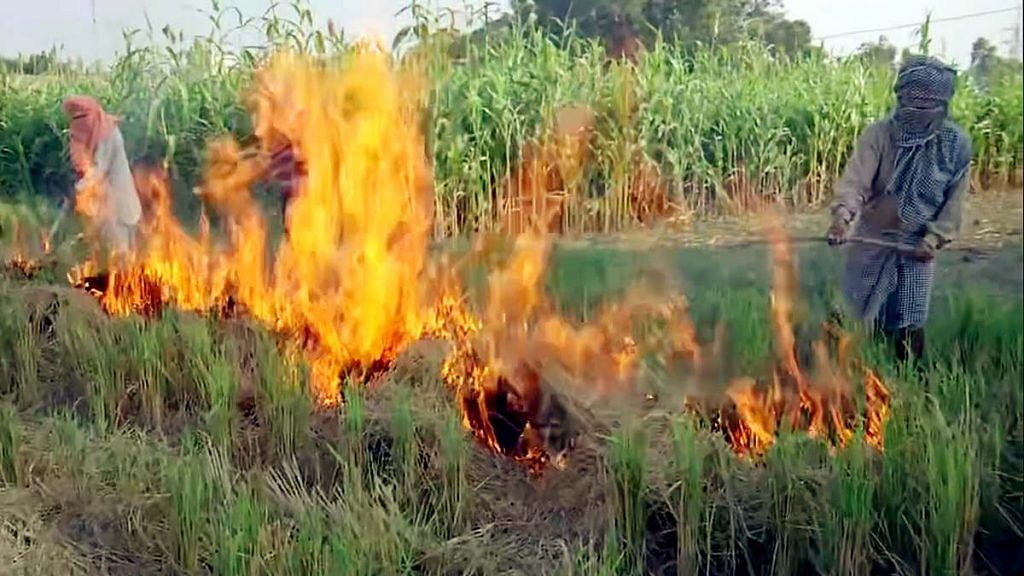Chandigarh: The number of paddy straw or stubble burning incidents in Punjab has shown a marked increase this season, and state government officials believe the reason is the early sowing of paddy due to lockdown restrictions in June, and thus, its early harvest.
Data from the same period — 21 September to 26 October — over the last three years shows that the number of stubble burning incidents recorded this year is 16,508, about 67 per cent higher than last year’s 9,845 and more than double the figure in 2018, which was 7,504.
“Since there was an acute shortage of labour due to the Covid-19 lockdown, farmers had cultivated paddy in early June. That has now been harvested early. Also, paddy procurement began early this time,” Punjab’s Agriculture Commissioner B.S. Sidhu told ThePrint.
Once paddy has been harvested, subsequent preparation of the fields for wheat cultivation forces farmers to burn the paddy stubble, Sidhu explained.
“The number of cases of stubble burning is more this time because farmers started preparing the fields early. After wheat cultivation is over, the number of total stubble burning incidents would be almost the same as last year, or maybe lower, given the efforts being put in by the state government,” he added.
Paddy was grown over 27 lakh hectares this year in Punjab, including Basmati cultivation on 7 lakh hectares. Cumulatively, this is expected to yield paddy residue of 16.5 million tonnes.
Also read: Air pollution could be linked to 15% of Covid deaths globally, new study says
What Punjab is doing to curb stubble burning
Last week, Union Environment Minister Prakash Javadekar said stubble burning contributes only 4 per cent of PM2.5 pollution in Delhi-NCR, while the rest is caused by local factors.
Punjab CM Captain Amarinder Singh had called this a vindication of his government’s stand on the issue. He said the air quality levels in Punjab were much better than those in Delhi, which would not have been the case had stubble fires been causing the pollution. Amarinder had reiterated his demand for financial support of Rs 100 per quintal from the Centre to eliminate the problem of stubble burning.
However, the Punjab government has already taken a number of steps to combat the problem, its officials said.
The main method Punjab is promoting to contain stubble burning is the installation of Super SMS (straw management system) on combine harvester machines. Additional Chief Secretary, Development, Anirudh Tewari said the government is providing 50 per cent subsidy on Super SMS for individual farmers and 80 per cent subsidy to village cooperatives.
As many as 50,815 crop residue management machines have been provided in the last two years, added Sidhu. “This year, we have started the process of distributing 26,607 such machines. Over 12,000 have already been distributed,” he said.
The Super SMS attached to combine harvesters cuts the paddy straw into small pieces, and spreads it evenly across fields, so farmers can plant the next crop without burning off residues. Other machines such as Happy Seeder, Zero-Till Drill and Super Seeder are also being provided on subsidy; they can also be hired on rent from custom hiring centres, panchayats and primary agricultural cooperative societies.
“Use of Super SMS gives a 9 per cent increase in yield (almost two quintal more produce per acre). The in situ residue management machines cost the farmer Rs 1,400 to 1,700 per acre,” Sidhu said.
Also read: Stubble burning still a problem, but let’s control Delhi’s internal pollution, says Gopal Rai
Environmental compensation
The Punjab government is also penalising the owners of harvester combines found operating without attaching the super SMS. This ‘environmental compensation’ is Rs 50,000, Rs 75,000 and Rs 1,00,000 for the first, second and third violations, respectively, and Rs 1,00,000 for each violation after that.
Last year, Rs 6.16 crore was collected as fines in over 23,300 cases. The figure has been Rs 51 lakh in 1,900 cases so far this year.
Not just this, the government has already announced that any combine harvester machines functioning without super SMS will be impounded.
Nodal officers
The government has also deployed 8,000 nodal officers to verify fire incidents reported by the Punjab Remote Sensing Centre, Ludhiana.
The nodal officers, who will be working in the villages till 15 November, are supposed to warn farmers about a ‘red entry’ made in their land record if they burn paddy straw. Last year, almost 24,000 ‘red entries’ were made in revenue records, while this year, the number so far is 1,653.
FIRs are also being lodged against farmers under Section 188 of the IPC. However, the number has declined sharply from 1,737 cases last year to just seven so far this year.
Also read: Pollution due to stubble burning can be controlled but political will lacking, says Kejriwal
